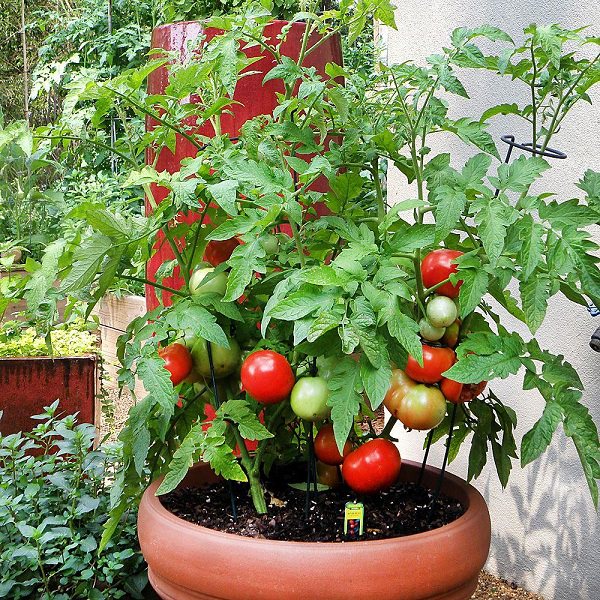Table of Content
Even if you don't have time for testing, you'll want to make sure your soil has plenty of humus — the organic matter, not the similarly named Mediterranean spread. According to 1000 Gardening Questions & Answers, you'll want to mix in compost, leaf and grass clippings, and manure. Manure should be composted, unless you aren't harvesting or planting anything for two months after application. Preferably, get your manure from local livestock that's organically and humanely raised.

Either way, know where the sunlight hits in your garden. This will allow you to plant varieties based on sunlight amount. There should be full sunlight, partial shade, and complete shade. Lead can leach out of weathered paint for many years and remain in the soil. Never plant fruit, veggies, herbs, or fruit-bearing trees in the soil next to your house if you know—or suspect—that it was painted with lead-based paint.
Organic Garden Maintenance
All you need to do is pick up all your leftover herbs and tie them together using a rubber band. Hang the bunches up with the tips down in a dry but shady place. More about compost from this article and was surprised that not everything should be used. Thanks to all authors for creating a page that has been read 136,431 times. For tips from our Horticulturist reviewer on how to test the pH of your soil, keep reading. Distance – The closer the garden is to your house, the more likely you are to tend to it regularly.

To avoid spreading diseases in your garden, don't work in it when the plants are wet. Promptly remove sickly plants and clean up spent plants. Plant propagation is an economical, rewarding and sustainable way to increase your plant stock and develop your horticultural skills. This is a comprehensive, practical guide to the various methods of propagation suitable for a wide range of trees, shrubs, herbaceous perennials, bulbs and tender plants. If you notice sick plants either during the season or at the end of the year, make sure you pull up the entire organism.
Preparing Your Soil for Organic Vegetables
Organic gardening been treated as some kind of leisure in my staying country and didn’t trigger much interest among the working group,probably due to their busy working schedule. But getting to eat a food that is free from pesticide benefit our health a lot. I hope that one day there is a way to reduce the cost of producing organic food, with the advance in planting technology. Spray the entire plant making sure to get both the top and bottom of leaves, the spray should come out of the nozzle fine and misty. Leave the solution on for two and a half hours then rinse plants with freshwater, do this once every seven days until there is no visible sign of insects.

Enrich the soil by creating a solid compost mix from peat moss, manure, mushroom soil, among other organic components. Also, know the right type of soil that will work best for your plants. Suppose you have limited garden space; consider growing your plants vertically or in a pot. If you use a potting plant, place it next to the window or your porch area to ensure it receives sufficient levels of sunlight. Also, ensure you have the right size of the container. Rotating your crops in the garden each year to a new location helps alleviate this problem.
The 25 Tips & Tricks On How To Grow An Organic Garden
This may be the most important step of the entire process. Sunlight is crucial for any garden, organic or conventional, to thrive. You want to select a spot that gets at least 6 – 8 hours each day so steer clear of areas in the yard that are well-shaded by large trees or structures. 11 years ago when we left NY and started living in the suburbs, I developed the passion for gardening. I'm a mom of two, and a big time gardener here helping you pick you right battle in gardening.

This 1 day practical workshop will provide you all the guidance and know-how you will need to grow healthy food using natural processes in your own growing space. Proper watering is important to any garden, so try not to over or under do it. In most cases, about a total of about one inch per week including rain should be fine. Try to water your plants early in the morning when the temperature is cooler to reduce evaporation and enhance absorption. It’s also best to focus on the roots and use water that’s close to the air temperature so delicate plants won’t be shocked. Growing an organic garden is not an overnight journey rather it takes plenty of time and effort.
This is due to the emphasis of compost/soil and what to do/not do that I related so well to." Avoid large amounts of watery fruits or vegetables such as tomatoes, oranges, cucumbers, melons, prepared foods, etc. . Some of the best plants for a small garden are Shallots, Kale, Lettuce, and Potatoes.

Applying mulch will also improve the water retention of the soil and prevent the formation of weeds. Nonetheless, avoid using any synthetic products in your organic garden. Note that different plant species have varying mature periods. Also, note that growing plants in an organic garden takes longer.
It also helps keep insect populations to a minimum as well. It conserves moisture below the soil surface, helping to keep roots hydrated. And with less evaporation, that means less watering chores for you as well. In fact, only about 2% of insects are bad for gardens. Some varieties will need full sunlight, whereas others will need full shade.

Organic pesticides are made from natural products or plant parts, these products work well in home gardens to help combat insects. Seeds can be purchased either package or brought as seedlings from your garden center. Do not plant seeds or seedlings to deeply about one to one and a half inches into the soil is good. Preparing the soil requires you to add organic compost to the soil. Usually, organic compost comprises peat moss, manure, mushroom soil, among other organic substances. Applying organic matter to your soil significantly enhances the quality of your soil.
Don't forget to rake up underneath, since diseased leaves can harbor problems for a long time. Put all infected material deep in the woods, in the ground at least a foot deep, or on the bonfire. Ideally, you want to water the roots, not the greenery, which is easily damaged.
A test lets you know if your soil needs soil amendmentsto restore pH balance and nutrient availability. It also lets you know about your soil's organic matter. At this moment, I unfortunately have not a suitable garden, since I am living in a big city.
Follow us:
And, how they can work together to help you produce a low maintenance garden that will produce an amazing harvest of natural produce, all of which you can consume without worry. Vertical gardening is a great way to save space, especially if you have a limited gardening area. Use the most suitable vertical gardening technique that works for you. Vertical gardening is also a great way to control pests and diseases.


No comments:
Post a Comment